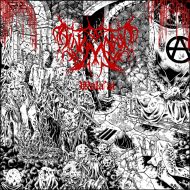 This appears to be the seventh album by the Saudi Arabian trio, which was formed in 2008. and while early albums focused on ancient Babylon, newer material is more topical and related to the Arabian Occult and entire Peninsula. Stylistically they are black metal with plenty of Arabian melodies and tempos running through their music to make it rather interesting to listen to.
This appears to be the seventh album by the Saudi Arabian trio, which was formed in 2008. and while early albums focused on ancient Babylon, newer material is more topical and related to the Arabian Occult and entire Peninsula. Stylistically they are black metal with plenty of Arabian melodies and tempos running through their music to make it rather interesting to listen to.
The album opens with short intro “Al Hirah” with its ancient sounding instruments being played way too close to a fire as an ominous sound builds behind it before crashing into “Sahra Yaesa” where rumbling kick drums are joined by Mephisto’s heavy guitars and Humbaba’s even heavier vocals, but it’s when Ostron brings in the middle eastern instruments that the song really comes to life.
“Tabqia” is full of galloping drum rolls as the guitar riffs are pulled behind them, while the vocals add a warble to the death growls.
“Kali Be Mekialain” has an infectious groove and bouncy rhythm to the drum tempo as the vocals range from very short and rapid to longer drawn out growls to accompany the melodic instrumentation.
A far more straight-ahead thrash track “Al Shareef Al Muhan” has chunky guitar riffs being played over a steady snare battery that can be sped up and slowed down to give the song an Arabian flare added to by the vocals.
Keeping things fast but with lyrics being spat out even faster, “Fasique” feels like a well-placed rant at high pace accompanied by heavy guitars and loads of cymbals.
They guitar melody on “Aar Al Estibad” is more heavy rock, even though the drumming is far faster and heavier, with vocals that are almost clean, but tinged with a touch of venom to add the required feeling of anger.
Owing to its slightly slower feel “Alhallaj” also come across as much heavier than some of the other tracks, but that could also be owing to the cutting snare and unrelenting drum rolls over the warbled vocals and tremoloed riffs.
The guitars and drums blast over “Wahum Althaat”‘s short intro on an ancient stringed instrument, but this time the guitars keep the riffs in line with the feel of those played on the lute making for an intriguing sound, which is employed once more on the final track “Alqaum”, where Mephisto also plays one of the only lead guitar breaks on the album.
While everything is sung in their native tongue, it does nothing but add to the flavour of the music, in much the same way it worked for Ulver and Dimmu Borgir on their early albums.
(7/10 Marco Gaminara)

Leave a Reply